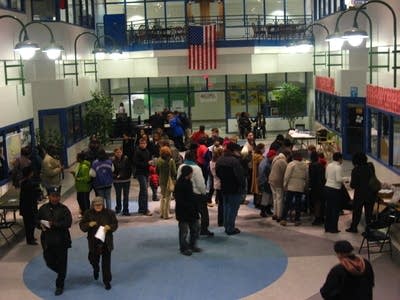Caucus goers turn out in record numbers
Go Deeper.
Create an account or log in to save stories.
Like this?
Thanks for liking this story! We have added it to a list of your favorite stories.

Dann Dobson was one of two volunteers staffing the back door of Ramsey Junior High School in St. Paul, host to 14 DFL precinct caucuses.
At a little after 7 p.m. the corridors were packed and the line stretched out the door, down the steps and a block down Summit Ave.

Dobson was doing his best to pass out maps to help voters figure out which room in the school corresponded with their address.
"It's an insane night, what can I say? We printed out 1,500 of these are they're already gone. We're recycling them," Dobson said.
Turn Up Your Support
MPR News helps you turn down the noise and build shared understanding. Turn up your support for this public resource and keep trusted journalism accessible to all.
Not far away, the 14 GOP precincts that met at Expo Elementary also saw record turnout. With about 500 people, it wasn't quite the mob scene DFLers saw at Ramsey, but 92-year-old Betty Runyon was still flabberghasted.

"I said to my husband, I didn't know there were that many Republicans in Highland Park, because we've lived here for 50 years and this is the most people I've ever seen," Runyon said.
The relatively warm weather Tuesday night may have boosted turnout. But Minneosta GOP spokesman Mark Drake said the big reason for blowout crowds is clear -- with both the Republican and Democratic presidential nominations up for grabs, Minnesota's presidential preference poll meant something this year.
"It's just a lot of excitement, a lot of enthusiasm. I think the decision to move the caucus up was a very wise decision by both political parties here," explained Drake.

Minnesota was one of 24 states to hold their voting on Feb. 5 this year, a day nicknamed Super Tuesday. That's the earliest day most states were allowed to vote.
Four years ago Minnesota was one of 10 states to vote on Super Tuesday, which was in March that year instead of February. In 2004, Republicans had an incumbent and their race was uncontested. And on the Democratic side, John Kerry was clearly leading his only remaining rival, John Edwards.
That is in sharp contrast to the neck-and-neck race between Hillary Clinton and Barack Obama leading up to Super Tuesday this year.

Mark Johnson, the site manager for 17 DFL precincts that met at St. Louis Park High School, said the DFL party clearly underestimated the size of the turnout.
"We were told to prepare initially for what we had in 2004, which was -- we registered I think about 1,400 people, and then we were told to double that, just to be safe. So we printed up enough ballots to do 3,000 at our site here, and we ran out of ballots a long time ago," Johnson said.
Naheeda Mirji-Halji said the caucus organizers at Brooklyn Center High School resorted to handing out Post-It notes for presidential polling at the DFL caucuses there.

"I was handed two ballots accidentally, so I could have voted twice if I'd wanted to," Miji-Halji said.
Mirji-Halji was a little alarmed at all the chaos -- long lines, people confused about where to go, and no one even asked her to prove she was eligible to vote.
"I heard a lot of people thinking, 'Is my ballot going to be counted? I'm writing it on a yellow Post-It,'" Mirji-Halji said.
Paul Slattery of St. Paul found the throngs of DFLers invigorating.

"When we pulled up and we saw the line stretched around the block, we thought, this is going to be a fantastic election," said Slattery.
But Slattery also saw the downside of caucuses, which as they currently exist for the Minnesota DFL and Republican parties, require voters to show up in a 90-minute window of time on a weeknight.
"I would consider a primary, definitely I'd consider a primary," said Slattery.
DFL Party Chairman Brian Melendez isn't calling for a move to the primary just yet. However, he is worried that some people might have gotten frustrated waiting in line or trying to find parking, and just given up.
"I think we might have reached the capacity of the caucus system. Because we are as prepared as we can be, but there are only so many bodies you can fit into a classroom, and so many cars you can fit in a parking lot, and we may have reached that point," Melendez said.
Minnesota Secretary of State Mark Richie said he's talking with Minnesota's political party leaders to figure out ways to streamline voting. But he said it's up to the parties to figure out the best way to choose delegates to their conventions.
Dear reader,
Political debates with family or friends can get heated. But what if there was a way to handle them better?
You can learn how to have civil political conversations with our new e-book!
Download our free e-book, Talking Sense: Have Hard Political Conversations, Better, and learn how to talk without the tension.







